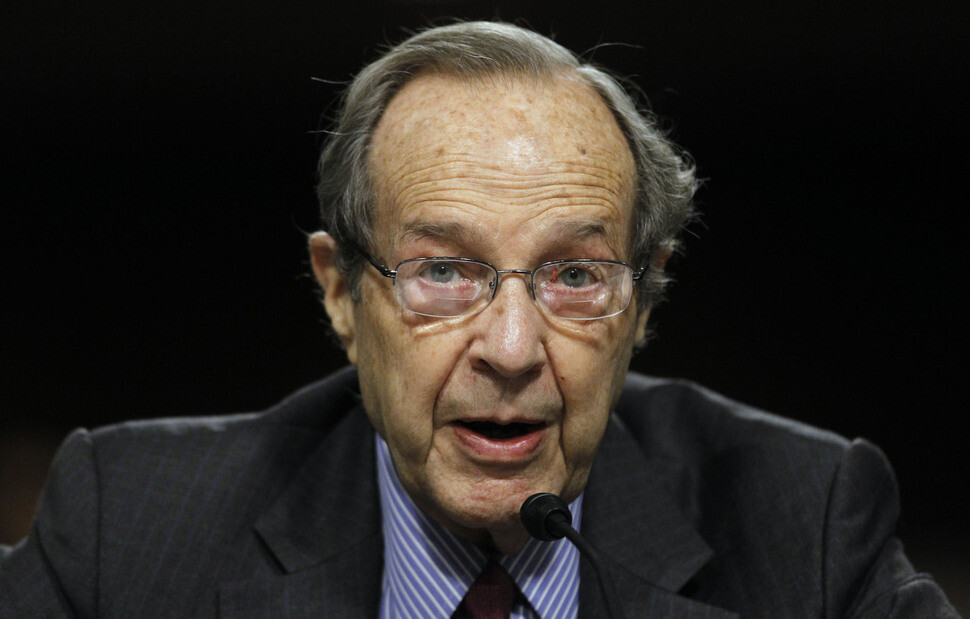hankyoreh
Links to other country sites 다른 나라 사이트 링크
US abandoned war plans with North Korea in 1994 over fears of massive casualties

The Clinton administration developed actual plans for a war with North Korea during the first nuclear crisis in the 1990s, but abandoned them over concerns about massive casualties, recently declassified documents show. The National Security Archive at George Washington University announced the discovery, which was based on statements by major figures and government agency reports found in confidential reports made public on Dec. 8.
According to a US Embassy in Seoul report, then-US North Korea Policy Coordinator William Perry told then-President Kim Dae-jung in a meeting on Dec. 7, 1998, that the US had planned for war when he was appointed Secretary of Defense during the North Korean nuclear crisis in June 1994.
“Of course, with the combined forces of the ROK and U.S., we can undoubtedly win the war,” Perry was quoted as telling Kim.
“But war involves many casualties in the process,” he continued.
“I am well aware of the negative aspects of war, and will do my best to avoid war,” he reassured Kim.
In 2006, Newsweek reported that a war on the Korean Peninsula would result in the deaths of at least one million people, including 52,000 US and 490,000 South Korean troops, and estimated costs to US Forces Korea of US$61.0 billion.
A 1997 State Department document reported the Clinton administration voiced concerns not only about North Korea’s nuclear program, but also about the potential for the famine in the 1990s to create a “dangerously chaotic situation.” Accordingly, it suggested the approach to the Four-Party Talks needed to be “flexible enough to encompass a wide range of options,” ranging from “a collapse of the North” to “meaningful reforms which would give the DPRK regime renewed vitality.”
Stephen Bosworth, a former US Ambassador to South Korea who passed away in Jan. 2016, wrote in a cable to the State Department that Kim’s performance at an inter-Korean summit on June 15, 2000, was “virtually flawless.”
“It is essential that the [US government] position continue to be one of complete support, publicly, privately, and in practice for the success of [Kim Dae-jung’s] engagement policy,” Bosworth wrote.
By Yi Yong-in, Washington correspondent

Editorial・opinion
![[Editorial] Does Yoon think the Korean public is wrong? [Editorial] Does Yoon think the Korean public is wrong?](https://flexible.img.hani.co.kr/flexible/normal/500/300/imgdb/original/2024/0417/8517133419684774.jpg) [Editorial] Does Yoon think the Korean public is wrong?
[Editorial] Does Yoon think the Korean public is wrong?![[Editorial] As it bolsters its alliance with US, Japan must be accountable for past [Editorial] As it bolsters its alliance with US, Japan must be accountable for past](https://flexible.img.hani.co.kr/flexible/normal/500/300/imgdb/original/2024/0417/6817133413968321.jpg) [Editorial] As it bolsters its alliance with US, Japan must be accountable for past
[Editorial] As it bolsters its alliance with US, Japan must be accountable for past- [Guest essay] Amending the Constitution is Yoon’s key to leaving office in public’s good graces
- [Editorial] 10 years on, lessons of Sewol tragedy must never be forgotten
- [Column] A death blow to Korea’s prosecutor politics
- [Correspondent’s column] The US and the end of Japanese pacifism
- [Guest essay] How Korea turned its trainee doctors into monsters
- [Guest essay] As someone who helped forge Seoul-Moscow ties, their status today troubles me
- [Editorial] Koreans sent a loud and clear message to Yoon
- [Column] In Korea’s midterm elections, it’s time for accountability
Most viewed articles
- 1[Column] The clock is ticking for Korea’s first lady
- 2Samsung barricades office as unionized workers strike for better conditions
- 3[Editorial] When the choice is kids or career, Korea will never overcome birth rate woes
- 4S. Korea, Japan reaffirm commitment to strengthening trilateral ties with US
- 5[News analysis] After elections, prosecutorial reform will likely make legislative agenda
- 6Japan officially says compensation of Korean forced laborers isn’t its responsibility
- 7Why Israel isn’t hitting Iran with immediate retaliation
- 8[Editorial] As it bolsters its alliance with US, Japan must be accountable for past
- 9[Editorial] Does Yoon think the Korean public is wrong?
- 10[Guest essay] How Korea turned its trainee doctors into monsters